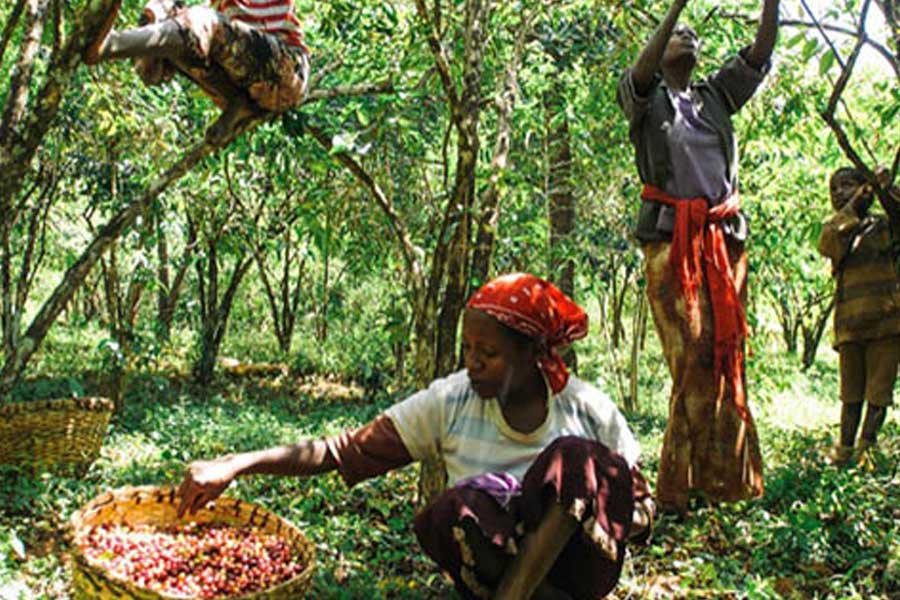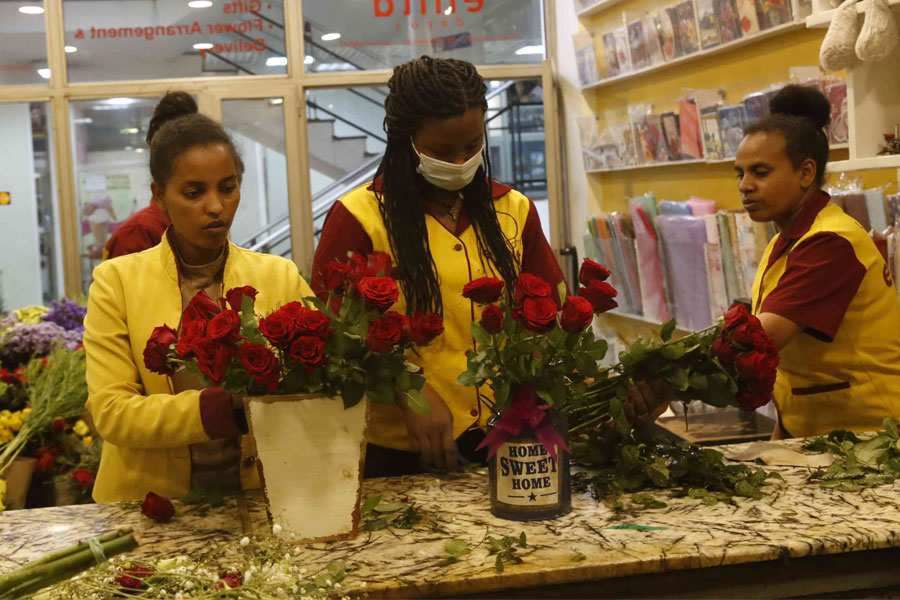
Radar | Dec 07,2019
As the harvest season hits its stride, the coffee industry faces a financial bind. Growers, exporters, and traders are scrambling as access to credit dries up, leaving them without the means to pay for labour or transportation costs; exporters are short on cash to buy the red coffee cherries ripe for this year's picking. The central bank's decision to cap credit growth at 14pc this year has only tightened the noose on the industry.
This credit drought overshadows the authorities' ambitious goal of securing 1.7 billion dollars from exporting 350,000tn of coffee this year. As global coffee prices plummet, the domestic industry's struggle is amplified by the tightened credit market.
Adugna Debela, head of the Ethiopian Coffee & Tea Authority, disclosed that negotiations are underway with the central bank to carve out financial relief for the sector.
"We are trying to be a priority sector for loan approvals," he told Fortune. "We're the facilitators, not decision makers in this."
He emphasised the coffee industry's plea to be treated as a priority for loan approvals - a sentiment he shared in a recent quarterly report to Parliament's standing committee on agriculture.
The Authority, Adugna noted, has discovered a troubling misuse of funds within the sector. In the previous year, loans amounting to 48 billion Br earmarked for coffee were allocated, but a substantial sum- approximately nine billion Birr - was diverted to non-coffee related spending, leading to the suspension of 58 exporters. This "sweeping credit pang," as Adugna described it, is compounded by regulatory decisions on loan disbursements, despite ongoing discussions with officials of the Ministry of Finance.
The Ethiopian Coffee Association, a lobby group voicing the industry's concerns, echoed the Authority.
Desalegn Jena, head of the Association, warns that the credit shortfall could drive growers and harvesters to seek other sources of finance. According to Desalegn, aligning local prices with the international market is crucial.
"Reconciling global prices with local ones is essential," he said.
Operational hurdles are increasingly apparent as exporters struggle to gather the harvest promptly when prices fall. Gizat Worku, the general manager of the Association, disclosed that close monitoring of fund allocation has revealed that only 37 exporters utilised loans appropriately. He suggested that while loan diversion is not a criminal act, it certainly does not facilitate exports.
As the country recorded a decline of seven percent in volumes and revenues from coffee, earning 1.3 billion dollars from 240,000tn shipped last year, industry analysts point to systemic issues.
Arega Shumete (PhD), a seasoned economist, attributed the sector's persistent fragility to the lack of coordinated efforts to enhance productivity over the years. He advocated for creating functional linkages within the sector and avoiding intermediaries to strengthen coffee's value proposition over the long term.
"International markets still dictate prices," said Arega. "The government should channel its finances to productive activities."
The coffee export community's struggles are personified by Shonora Trading Plc, a four-year-old company teaming with growers in the southern region of Guji. The company's major shareholder, Adugna Shora, recounted the hurdles in securing credit.
"The past two years have been marked by credit shortage," he told Fortune.
According to Adugna, the banks have even delayed giving the export earnings in local currency while denying loan access. The exporter had earned one million dollars last year from coffee exports, an 80pc drop from the previous amounts.
"We've submitted our concerns to various institutions with little feedback," he told Fortune.
However, after being turned down by four banks, Shora finally received 70pc of the loans his company sought from Awash Bank. However, its export earnings have significantly dwindled over the past two years.
The strain is also felt by Homeland Organic Coffee Argo-Industry Plc, a company operating on a 500hct farm caught in a year-long wait for a 20 million Br loan. The General Manager, Fikadu Hailemariam, voiced waning expectations.
"We're losing hope," Fikadu told Fortune.
Leaders, however, offer a different perspective.
Asfaw Alemu, president of Dashen Bank, pointed out that the coffee sector is still a lending priority due to its potential for foreign currency earnings. He views the credit issue as part of a broader economic tightening rather than a problem unique to coffee exporters.
Coffee farmers are feeling the market's squeeze firsthand.
Kucheto Gebre, a coffee farmer in Dita Wereda of the Kefa Zone, lamented that offers from exporters have halved to 25 Br a kilogram, reducing his income substantially.
"I pay four Birr a kilogram to the washers and pluckers only," he said.
He also criticised regulations limiting the storage time of coffee in warehouses to six months, which restricts growers' flexibility in securing fair prices. The grower is frustrated over the prices he was getting from his produce of the four-hectare plot.
"My entire family feeds off this one-time harvest," he said, revealing plans to enter horticulture in the coming year.
PUBLISHED ON
[ VOL
, NO
]

Radar | Dec 07,2019

Radar | Oct 01,2022

Radar | Sep 18,2023

Fortune News | Dec 19,2020

Agenda | Feb 10,2024

Dec 22 , 2024 . By TIZITA SHEWAFERAW
Charged with transforming colossal state-owned enterprises into modern and competitiv...

Aug 18 , 2024 . By AKSAH ITALO
Although predictable Yonas Zerihun's job in the ride-hailing service is not immune to...

Jul 28 , 2024 . By TIZITA SHEWAFERAW
Unhabitual, perhaps too many, Samuel Gebreyohannes, 38, used to occasionally enjoy a couple of beers at breakfast. However, he recently swit...

Jul 13 , 2024 . By AKSAH ITALO
Investors who rely on tractors, trucks, and field vehicles for commuting, transporting commodities, and f...

Oct 11 , 2025
Ladislas Farago, a roving Associated Press (AP) correspondent, arrived in Ethiopia in...

Oct 4 , 2025
Eyob Tekalegn (PhD) had been in the Governor's chair for only weeks when, on Septembe...

Sep 27 , 2025
Four years into an experiment with “shock therapy” in education, the national moo...

Sep 20 , 2025
Getachew Reda's return to the national stage was always going to stir attention. Once...